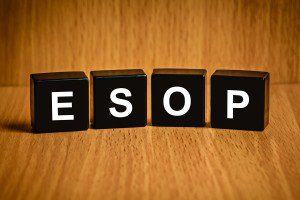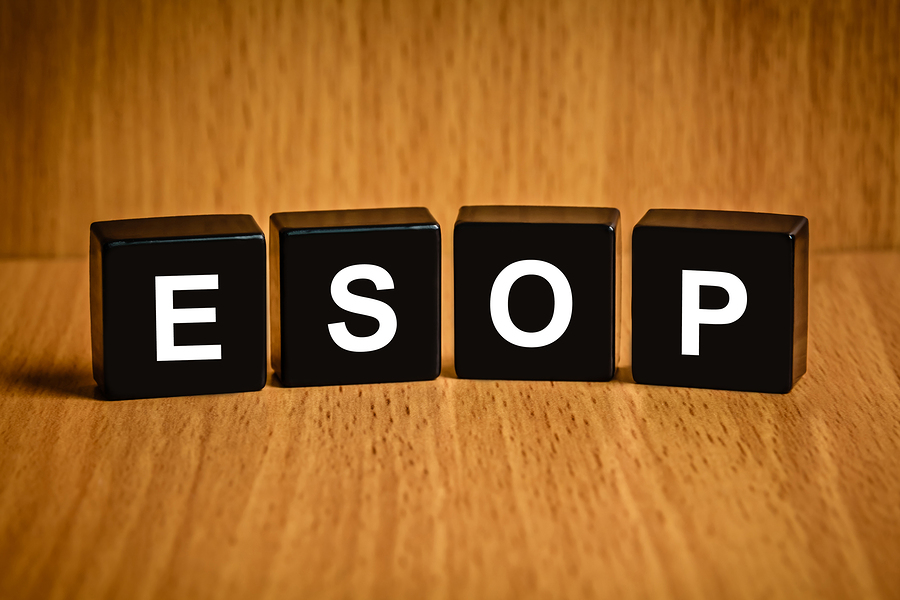- ERC Tax Return Amendment Rules Change - March 25, 2025
- Safe Financial Instruments Guide - December 4, 2024
- New Overtime Rule Increases the Salary Exemption Thresholds - November 19, 2024
Do you have a Question?
Ask below. One of our Investors or Advisors will Answer!

The method chosen to transfer ownership of a business for sale is one of the most important factors to consider as a business owner. And the reason for its importance is related to the wide differences in the amount of cash received (net of taxes) by the business owner across the various methods of transfer or sale.
An ESOP or Employee Stock Ownership Plan is one method of ownership transfer or sale business owners consider when they decide it’s time to retire. That said, let’s explore the ESOP as a potential method of transfer or sale from both the business owner’s and employees’ perspectives.
How Does an ESOP Work?
When a company wants to set up an ESOP, it establishes a trust fund. The company then contributes new shares of stock or cash to buy existing shares. The shares are divided among employee accounts within the trust. Vesting schedules vary between individual plans, but employees must receive vested benefits on either a cliff vesting schedule, which is 100% vested after 3 years or less, or on a graded vesting schedule, which provides 20% vesting every year after the second year of employment.
Employers pay ESOP distributions when employees leave the company. The employee is given the stock they have accrued, and the company must buy back the shares at a fair market value if there is no public market for them.
How Does an ESOP Get Funded?
There are three main ways ESOPs get funded.
1. The business can put new shares directly into the ESOP trust fund.
2. The business can put cash into the fund to buy existing shares.
3. The ESOP can be used to borrow money to buy the business’ stock shares.
All company contributions to the fund are tax-deductible.
Is an ESOP a Qualified Retirement Plan?
ESOPs are qualified retirement plans, meaning they satisfy requirements laid out in Internal Revenue Code Section 401(a).
Despite this, employees should not depend on an ESOP as the sole method of financing their retirement.
For instance, if the company stock fails to increase in value or decreases, the employee’s benefit remains flat or loses value.
If the company closes completely, the employee will lose their benefits entirely.
And while varied investment options exist after an employee has participated in the ESOP for 10 years and has reached 55 years of age, ESOPs can lack essential diversification.
The ESOP vs 401K Plan
Both ESOPs and 401(k) plans are retirement accounts offered by employers.
With a 401(k), the employer’s contributions are tax-deferred, meaning that the money is taken out of each paycheck before taxes, and those wages are not taxed until withdrawal.
Whereas with an ESOP, employees also do not pay taxes on the shares in their account until distribution.
In both situations, employers may offer matching contributions.
How is an ESOP Beneficial to a Business Owner?
ESOPs are beneficial to business owners in several ways.
1. The owner can sell part or all of their shares to their employees, while still retaining control of the business operations.
2. Establishing the ESOP trust also ensures there is a market for the owner’s shares.
3. Transfers to an ESOP allow the business owner to defer or bypass capital gains taxes.
4. ESOPs come with even more tax benefits:
a. contributions of stock and cash are both tax-deductible.
b. when the ESOP is used to borrow money, both the loan repayments and interest are also tax-deductible.
5. Allowing employees to own part of the company can also result in increased loyalty and productivity, as they have the ability to impact the value of the stock directly.
How an ESOP may be Beneficial to Employees
If the company has done well, an ESOP account may have performed better than typical investments in an index fund.
Contributions to the ESOP are also permitted to grow tax-free until the distributions are paid. When employees receive their ESOP distributions, they have the option to roll them over into an IRA or other retirement plan and avoid paying taxes until the money is withdrawn for retirement.















Hello,
I would like to know that I left the company that originally had 401K and ESOP but then they merged both and become only ESOP , I joined the other which only has ESOP, I did not do anything with my previous ESOP, do I need to do anything or it can stay there.
Hi Ruby,
Your ESOP Administrator for the company you are no longer employed by should be able to address your question as your specific circumstances must be addressed.
Whether your ESOP balance was vested, when and under what circumstances you left the company, your age, etc. are some of the factors that will be important.
I encourage you to seek help from the ESOP Administrator for your plan.
All the best…
My company ESOP is doing well. It yearly offers me the option to diversify some of my ESOP shares into my company 401K. What is the best option as far as deciding factors? I’ve heard it’s better not to have all your eggs in one basket, but nothing else, so I have done it for 2 or 3 years. However I don’t want to be losing money, which I may be since I don’t really understand the ramifications!
Hi Julie,
While I agree with many others and believe diversification is a very good policy when it comes to investing.
You should consult with your 401K Plan Advisor about the options you have and how these option would fit into your own personal savings/retirement plan.
If your company offers a 401K plan, a financial advisor has been hired to help each retirement plan participant. Take advantage of this professional assistance — it’s part of your company’s retirement plan offering.
All the best…
Hi, I worked for a company for 15 years and we had a very successful ESOP program. Stupid me pulled all the money out after a three year wait because I really need the money. Now I realize im going to end up paying most of the money in taxes. Is there a grace period? I cashed the check 30 days ago. Can I still put some into an IRA or my new 401k to avoid the severe taxes?
Hi, I have been with an ESOP company for 34 years, I am 57, and would like to retire at the end of our fiscal year 2018, which is October 31 2018. We receive our ESOP distribution in Feb. I also have a 401K with the company. Will I still be able to roll my distribution from my ESOP to my 401K, even if I am retired? Thank you for your time!
I had a 401K Plan with my former company. I left my former company but kept the 401K Plan with them. After 10 years, now the company got acquired to a company having ESOP. What happens to my 401K Plan now? Will they pay me out? What are the rules and regulations of this? I have never been an employee of the acquiring company. Do I have to forfeit my 401K Plan and the money in it or will they pay me out?
Hi VJ,
Please pardon our delayed response to your question…
We learned last week that our site host was not able to handle the size and level of activity of our visitors so we put things on hold, found a new host and made the move. It was a long week!
Yesterday, we were able to fully-restore the site and now are able to move forward with posting and Q&A.
Thank you for your patience!
The 401K Plan Balance you have from your former employer belongs to you and you have the right to roll it over to an Individual IRA account.
If you would like assistance with this, please send in a request here and we will be happy to introduce you to an advisor who can help you further.
I work for a small business (under 300 people). I participate in the company ESOP program and am fully vested. I currently receive about $30,000 once a year in late March, which is transferred to my ESOP account 90 days later. About $1500 is mandatory and the rest discretionary. I want to take early retirement and I am trying to time my retirement so I can maximize my ESOP distribution and give a fair notice to the company so they can hire a replacement. My understanding is that I must work the entire calendar year (according) to the ESOP plan booklet and that I must be 65 years of age. I will be 56. If I give notice 6 months in advance the company could walk me to the door on Dec 30th and I would lose the entire ESOP for the year $30,000. If I tell them after I receive my distribution statement for the prior work year in March, give them 90 days notice they could walk me to the door, (I would lose $7500 for the current work year) have me stay the 90 days ( I would lose $15,000) or I could give 90 day notice with an option to stay longer that would include a sweetener from the company to make up for the loss of the $30,000 for the year. My underlying assumption is the company is not required to contribute anything to ESOP if they walk me to the door Dec 30. Is this true?
Good morning,
My company annouced out of the blue yesterday, that they would no longer be contributing to our 401ks and instead will be contributing to a new ESOP, managed by the same company that holds our 401s and IRAs. There is no education about the ESOP on the managing site. We’ve been advised that we can diversify immediately out of employer stock and into the exact same funds that are available via the 401 and IRA plans. What was the point? I feel like Ive just lost a huge part of my retirement plan since Im starting a ‘new plan’ from scratch and loosing 1/2 of the expected funds to my largest account. I’m not certain how to recover from this blow within 15 years or how to divvy up the amount I contribute to each one. If they all have the exact same stocks in them, doesnt it make more sense to get the better dividends by contributing to the largest one?
I have a feeling we work for the same company (G—-)
I’m interested in the answer to this. I don’t like this new SOP plan!
Hello Holly,
I work for a construction company that has had an ESOP since around 2006. We had a really hard time during the recession and our ESOP value dropped as a result. Since then we have weathered the recession and are doing well and the ESOP values have improved. But the value of the ESOP to our employees as a benefit has been greatly damaged. We are working to address that but for the time being our employees are asking for a 401k because they don’t feel they have any control of their ESOP. They were told that the company cannot provide a 401k and ESOP at the same time because of regulations. Is this true? Would you have any suggestions for how we can restore the confidence of our employees?
Hi Tim,
I don’t believe that’s true, albeit there are overall limitations to the contributions to the ESOP and the 401K which must be considered.
The best way I know to build confidence in how your employees view your company is by being transparent with them. Share what you’ve just expressed and keep them informed as much as possible.
All the best to you Tim…
My daughter’s company offers a 401K and a Stock Option Plan. This is her first job since graduating college ( yay!! she’s employed and out of the house!!). She currently contributes 2% of her earning to the SOP and 6% to the 401K. If she decides to contribute more towards retirement, would it be more beneficial to increase the 401K or the SOP contribution, or both equal amounts? Thanks
Hi Tom,
Congrats of your daughter’s success and your empty nest! LOL
And it’s great she’s contributing 8% of her income to her retirement through her job too!
You may want to encourage her to increase the percentage contributed every year by 1% until it reaches 15%. Increasing the savings rate inch-by-inch every year makes it easier to reach an ideal retirement plan savings rate.
It’s very difficult to determine whether contributing in the future more to the 401K vs. the Stock Option Plan is best because the ultimate assets built up over time will depend on what happens in the stock market/bond market vs. the company for which your daughter works for.
That said, she should consider maxing out the 401K plan contribution rate if her employer matches any of her contributions. The employer 401k match is a 100% return on her investment on day one! So that’s an easy decision to make.
All the best to you and your daughter Tom…
Is it better to work for a company that is ESOP or one that has 401k retirement plan that matches your contributions?
Hi Frank,
There truly isn’t a clear-cut answer to your question I am sorry to say.
An ESOP can be very beneficial to its employees/owners if the business is sound and profitable.
And a 401K retirement plan, where the business matches contributions made by its employees to the plan, can be beneficial too.
In both cases, the employee’s ultimate retirement plan assets will be based on what happens in the future — for the ESOP Business or the underlying stocks invested in through the 401K plan.